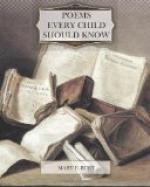“Yet give one kiss to your
mother dear!
Alas! my child,
I sinn’d for thee.”
“O mother, mother, mother,”
she said,
“So strange it
seems to me.
“Yet here’s a kiss for
my mother dear,
My mother dear,
if this be so,
And lay your hand upon my
head,
And bless me,
mother, ere I go.”
She clad herself in a russet
gown,
She was no longer
Lady Clare:
She went by dale, and she
went by down,
With a single
rose in her hair.
The lily-white doe Lord Ronald
had brought
Leapt up from
where she lay,
Dropt her head in the maiden’s
hand,
And follow’d
her all the way.
Down stept Lord Ronald from
his tower:
“O Lady Clare,
you shame your worth!
Why come you drest like a
village maid,
That are the flower
of the earth?”
“If I come drest like a village
maid,
I am but as my
fortunes are:
I am a beggar born,”
she said,
“And not the Lady
Clare.”
“Play me no tricks,”
said Lord Ronald,
“For I am yours
in word and in deed.
Play me no tricks,”
said Lord Ronald,
“Your riddle is
hard to read.”
O and proudly stood she up!
Her heart within
her did not fail:
She look’d into Lord
Ronald’s eyes,
And told him all
her nurse’s tale.
He laugh’d a laugh of
merry scorn:
He turn’d
and kiss’d her where she stood:
“If you are not the heiress
born?
And I,”
said he, “the next in blood—
“If you are not the heiress
born,
And I,”
said he, “the lawful heir,
We two will wed to-morrow
morn,
And you shall
still be Lady Clare.”
ALFRED TENNYSON.
THE LORD OF BURLEIGH.
In her ear he whispers gaily,
“If my heart by
signs can tell,
Maiden, I have watched thee
daily,
And I think thou
lov’st me well.”
She replies, in accents fainter,
“There is none
I love like thee.”
He is but a landscape-painter,
And a village
maiden she.
He to lips, that fondly falter,
Presses his without
reproof;
Leads her to the village altar,
And they leave
her father’s roof.
“I can make no marriage present;
Little can I give
my wife.
Love will make our cottage
pleasant,
And I love thee
more than life.”
They by parks and lodges going
See the lordly
castles stand;
Summer woods, about them blowing,
Made a murmur
in the land.
From deep thought himself
he rouses,
Says to her that
loves him well,
“Let us see these handsome
houses
Where the wealthy
nobles dwell.”
So she goes by him attended,
Hears him lovingly
converse,
Sees whatever fair and splendid
Lay betwixt his
home and hers.




